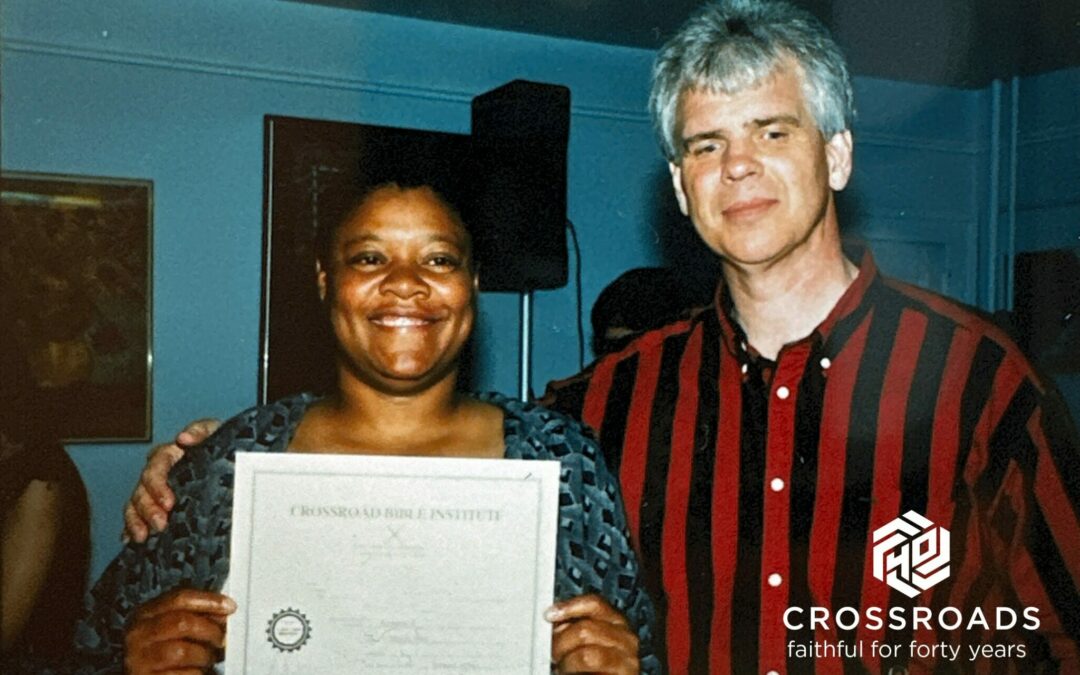Tom de Vries found a passion for prison ministry when he joined his father-in-law in visiting the Kent County Jail in Grand Rapids, Michigan. The experience planted seeds in his heart and those of his extended family.
This blog post is part of a special series commemorating forty years of ministry. We invite you to join us in reflecting on our history and looking forward to the future of bringing the hope of the Gospel to men and women behind bars. Click here to view the full series.
The organization now known as Crossroads Prison Ministries began with a friendly invitation.
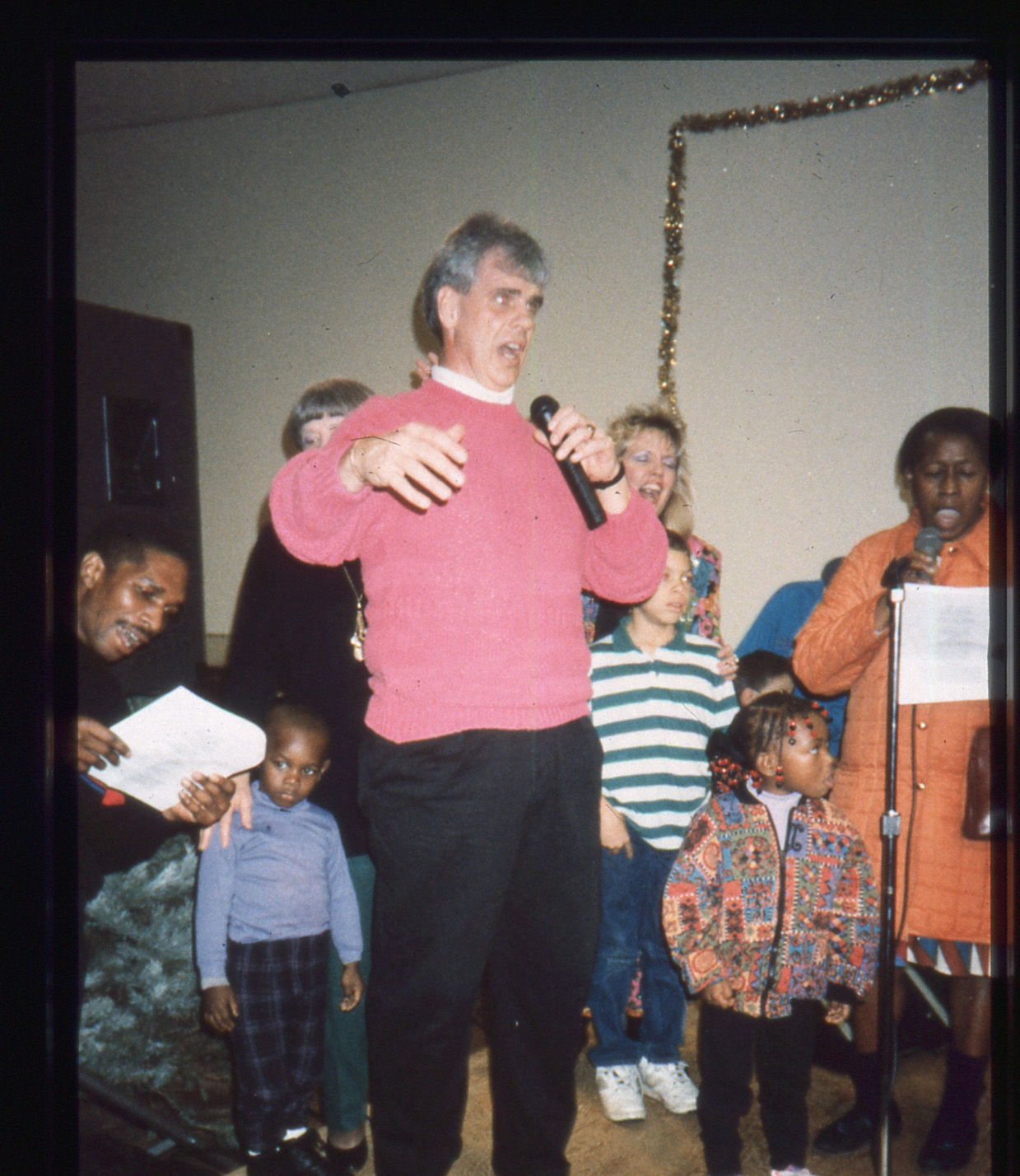
Tom de Vries was a charismatic speaker who could hold the attention of audiences with song and extemporaneous speaking.
In the early 1980s, Marinus Arnoudse invited his son-in-law, Tom de Vries, to join him on his weekly trip to the Kent County Jail. He invited Tom because he thought he would be good at serving through the local jail ministry.
“Tom loved it,” said Judy de Vries Wetters, his wife at the time. “Tom would get into conversations, and he really researched answers to questions the men had. But in jail, they are here today, gone tomorrow, so he couldn’t share the answers.”
Tom and Judy were committed to the Great Commission to make disciples of all nations, and they were equally committed to the second phrase in the command: “and teaching them to obey everything I have commanded you” (Matthew 28:19–20). Tom quickly saw that weekly jail visits were only the first step to fulfilling the Great Commission. How could they possibly “teach everything”?
It was clear to Tom and Judy that they needed to provide long-term Christian education. Tom set to work finding a curriculum for new believers, and he chose materials by the Mailbox Club, a mail-based Bible study ministry for youth.
“Tom brought the lessons to the jail. He told them, ‘Do this lesson, and with each one you do, I will write a letter of encouragement,’” Judy said. “The letters were there from the beginning.”
Why letters?
“Tom had amazing abilities to read people,” Judy said. “He saw the hunger for God’s Word but also the hunger for contact with other human beings. The letters were essential from the very beginning.”
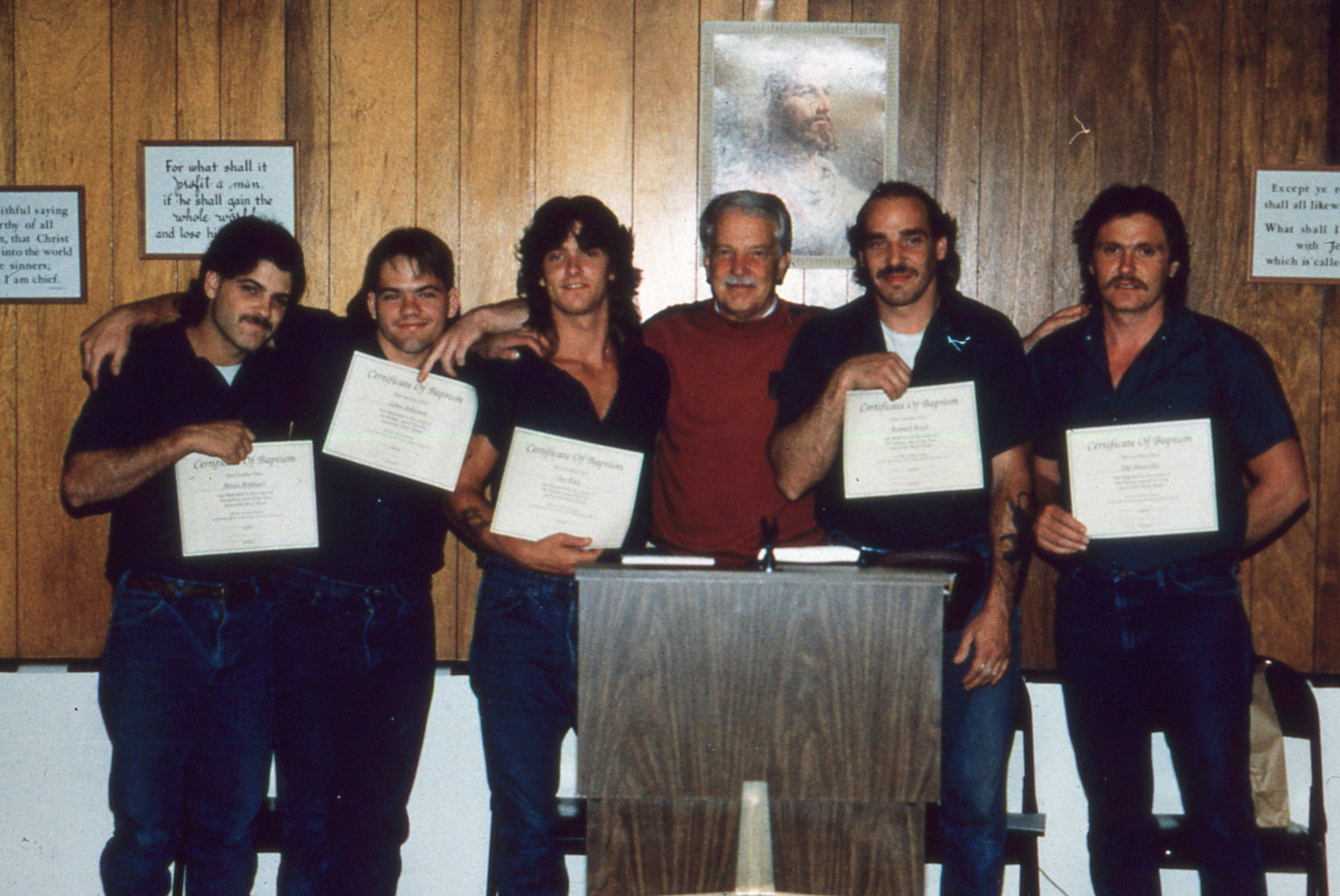
In the early days, Crossroads collaborated with the ministry now known as Reach the Forgotten to minister to Kent County Honor Camp participants at the Kent County Jail. Students pose with volunteer Andy VanderWall.
And so, Crossroads came into being in the de Vrieses’ home and the offices at the family’s car dealership that Tom ran with his brother, Jim, on the north side of Grand Rapids. Along with the deep involvement of their immediate family and their church, the new organization relied on a band of dedicated volunteers from churches to get Crossroads going. The de Vrieses’ three young daughters even helped by writing letters and making bookmarks at the family’s kitchen table.
The personal touch of the letters and lessons quickly drew students. The family needed volunteers and funds for printing and mailing lessons. As Tom enlisted volunteers from area churches, Jim worked behind the scenes, figuring out how to manage the mail, volunteers, and expenses. Jim submitted the legal documents for Crossroads to become a nonprofit entity in 1984. Judy and other family members mentored students and volunteered in the office.
By the late 1980s and early 1990s, Tom and Jim had recruited a board and the support of theologians to develop a curriculum specifically for people behind bars. Tom enlisted the help of Dr. Ed Roels, president emeritus of Reformed Bible College (now Kuyper College), and Robert denDulk, retired president of Westminster Theological Seminary. In this time frame, the curriculum was organized into two tiers, and it was written to be relevant to people living behind bars.
Small Ministry, National Platform
Crossroads was one of several jail and prison ministries nationwide that emerged in the 1980s and grew a local following. Nationally, there was more interest in ministering to people behind bars, driven in part by Chuck Colson, the former Nixon administration staffer whose prison conversion led to the formation of Prison Fellowship, the nation’s largest prison ministry.
In this context, people involved in prison outreach began forming networks and partnerships. In 1992, Tom de Vries attended a meeting of leaders from various jail and prison ministries in Chicago at the offices of the Christian Reformed Church’s broadcast ministries. He was introduced to David Feddes, head of the denomination’s broadcast ministry and the preacher on the Back to God Hour radio program. In addition to reaching thousands of households every week, Feddes’s radio broadcast reached listeners behind bars throughout the United States and Canada.
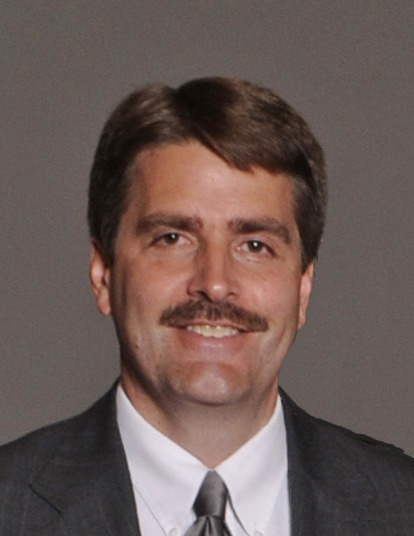
The Rev. David Feddes helped to launch Crossroads into a national ministry by promoting the ministry on his Back to God Hour radio show.
Feddes was impressed by the potential of Crossroads’ model. Crossroads provided him with a helpful response for the dozens of incarcerated people who wrote to him every month. He started sharing Crossroads on his radio show and telling incarcerated people how they could enroll. He also mailed enrollment cards to every incarcerated person who wrote to him.
“In a short number of years, Crossroads went from a few hundred students in Michigan to something like 3,000 in every state and even some in Canada,” Feddes recalled. “From there, it just kept growing.”
Judy clearly recalls the sudden overwhelm they experienced at the rapid growth. They needed volunteers and funds quickly. In those days, volunteers reviewed lessons in the tiny Crossroads office inside the family car dealership. With the increased volume, that was no longer feasible. The organization shifted to mailing packages of lessons to coordinators at area churches that disbursed them to their network of volunteers within their congregations.
To help with the need for mentors, Feddes again stepped up to help by promoting the volunteer opportunity on his radio show. In addition, he promoted Crossroads on his nationwide preaching and speaking tours. Volunteers all over the country responded to the call to visit people behind bars without needing to leave home.
By 1994, Tom and Judy were traveling throughout the United States to train volunteers. The ones who couldn’t train in person received VHS tapes of recorded training sessions. Correspondingly, the organization grew in capacity to raise funds, hire a small staff, and eventually move into an office space owned by a board member in Grandville, Michigan.
“If someone had told us how fast we would grow, it would have put us over the edge. We were scared enough already before the massive growth,” Judy said. “One thing I can say is that God’s grace is sufficient, and He carried us through.”
The growth continued through the 1990s. By 1998, Crossroads was no longer a small family start-up ministry. It was an international nonprofit ministry with offices, staff, and a board of directors.
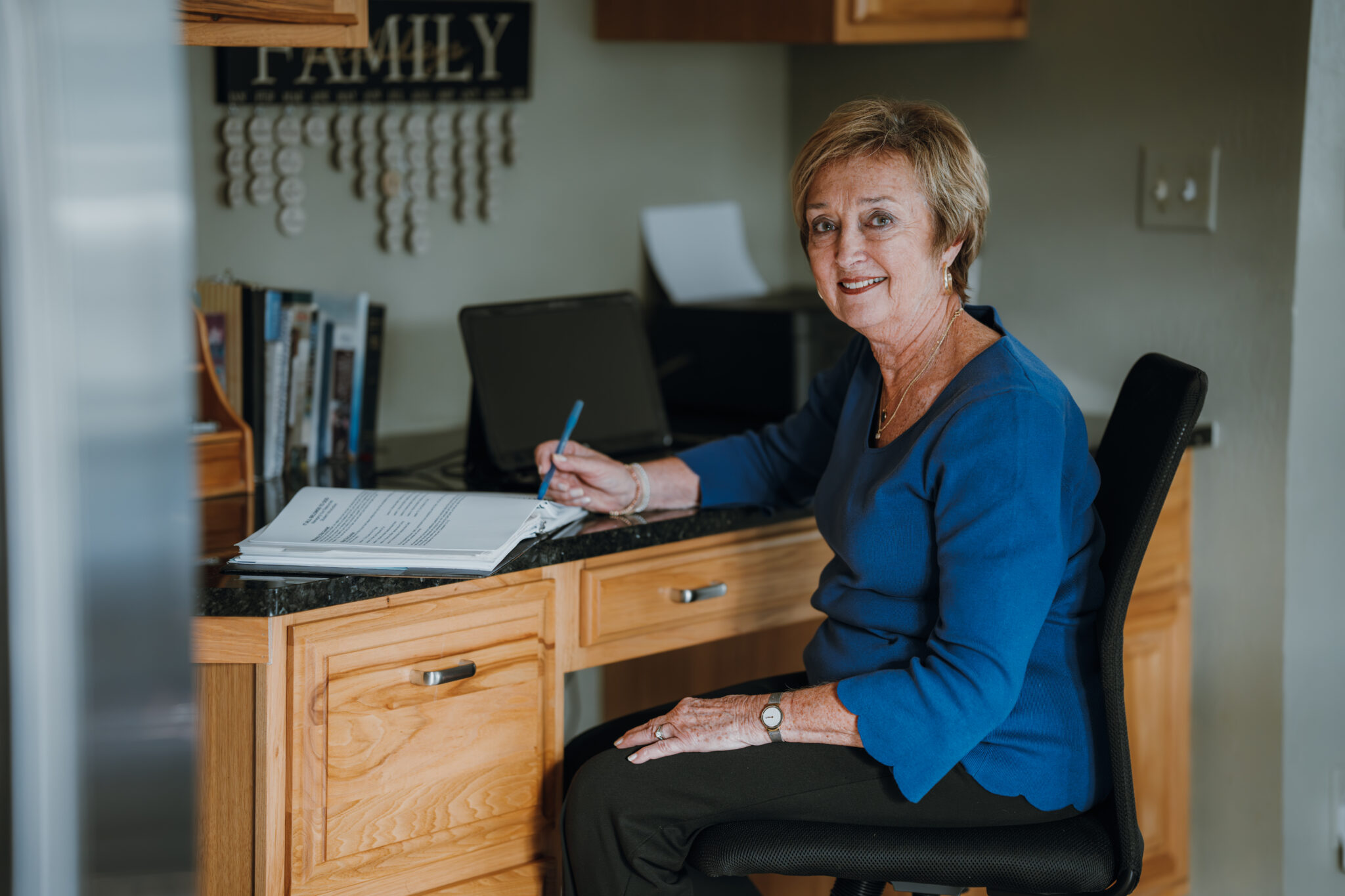
Judy de Vries Wetters continues to mentor Crossroads students.
Read part 2: Shifting from Startup Energy to Stability
Read part 3: An Era of Removing Barriers
Read part 4: Resilience and Innovation in the Face of Uncertainty
Read part 5: Mailing Restrictions and Alternative Delivery Methods
Sign up for updates!
Get news and stories from Crossroads Prison Ministries delivered straight to your inbox.


